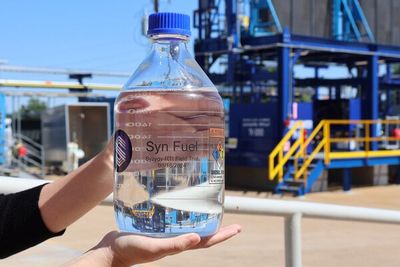SAF production
Syzygy partners with fellow Houston co. on sustainable aviation fuel facility

Syzygy Plasmonics has partnered with Volycys on its NovaSAF 1 project, which will convert biogas into sustainable aviation fuel in Uruguay. Photo courtesy of Syzygy
Houston-based Syzygy Plasmonics has announced a partnership with Velocys, another Houston company, on its first-of-its-kind sustainable aviation fuel (SAF) production project in Uruguay.
Velocys was selected to provide Fischer-Tropsch technology for the project. Fischer-Tropsch technology converts synthesis gas into liquid hydrocarbons, which is key for producing synthetic fuels like SAF.
Syzygy estimates that the project, known as NovaSAF 1, will produce over 350,000 gallons of SAF annually. It is backed by Uruguay’s largest dairy and agri-energy operations, Estancias del Lago, with permitting and equipment sourcing ongoing. Syzygy hopes to start operations by 2027.
"This project proves that profitable SAF production doesn't have to wait on future infrastructure," Trevor Best, CEO of Syzygy Plasmonics, said in a news release. "With Velocys, we're bringing in a complete, modular solution that drives down overall production costs and is ready to scale. Uruguay is only the start."
The NovaSAF 1 facility will convert dairy waste and biogas into drop-in jet fuel using renewable electricity and waste gas via its light-driven GHG e-Reforming technology. The facility is expected to produce SAF with at least an 80 percent reduction in carbon intensity compared to Jet A fuel.
Syzygy will use Velocys’ microFTL technology to convert syngas into high-yield jet fuel. Velocys’ microFTL will help maximize fuel output, which will assist in driving down the cost required to produce synthetic fuel.
"We're proud to bring our FT technology into a project that's changing the game," Matthew Viergutz, CEO of Velocys, added in the release. "This is what innovation looks like—fast, flexible, and focused on making SAF production affordable."